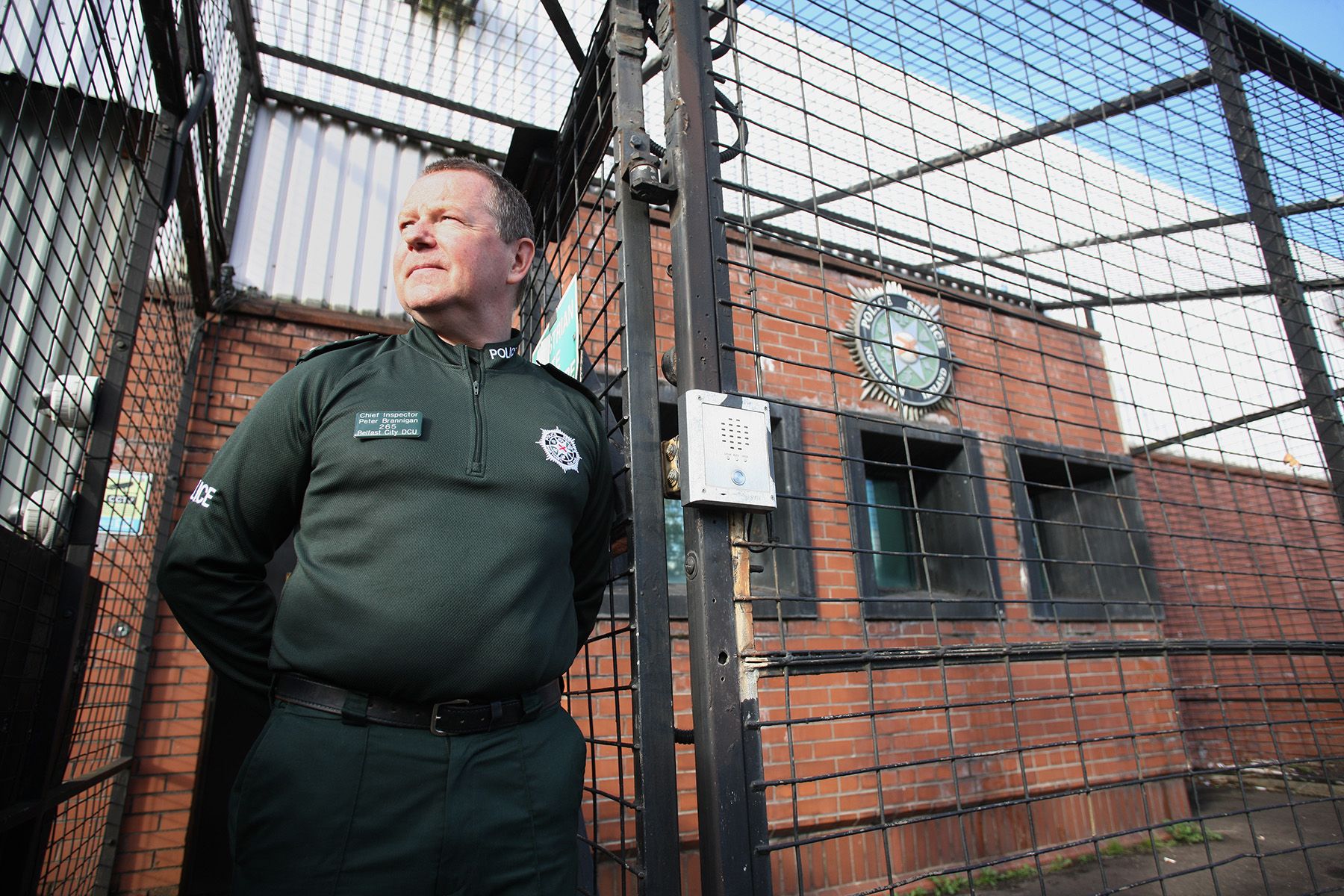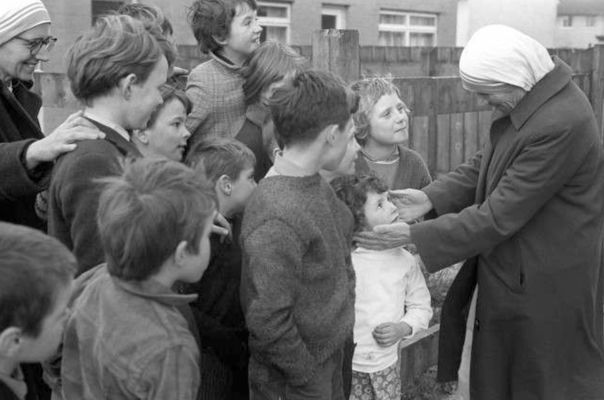THE Chief Inspector who oversees policing in West Belfast has said that he would like to see the militarised façade of Woodbourne Police Station scaled back.
In a lengthy interview with the Andersonstown News, Chief Inspector Peter Brannigan praised the local community for their strong leadership and detailed his hopes for the continuation of normalised policing in the area.
Having served within the RUC and PSNI for 34 years, Chief Inspector Brannigan has spent 12 of those years in West Belfast and believes that he has a different view in how the area should be policed.
SITE: Chief Inspector Brannigan said that the site is "strategically located" to offer reassurance to the loyalist community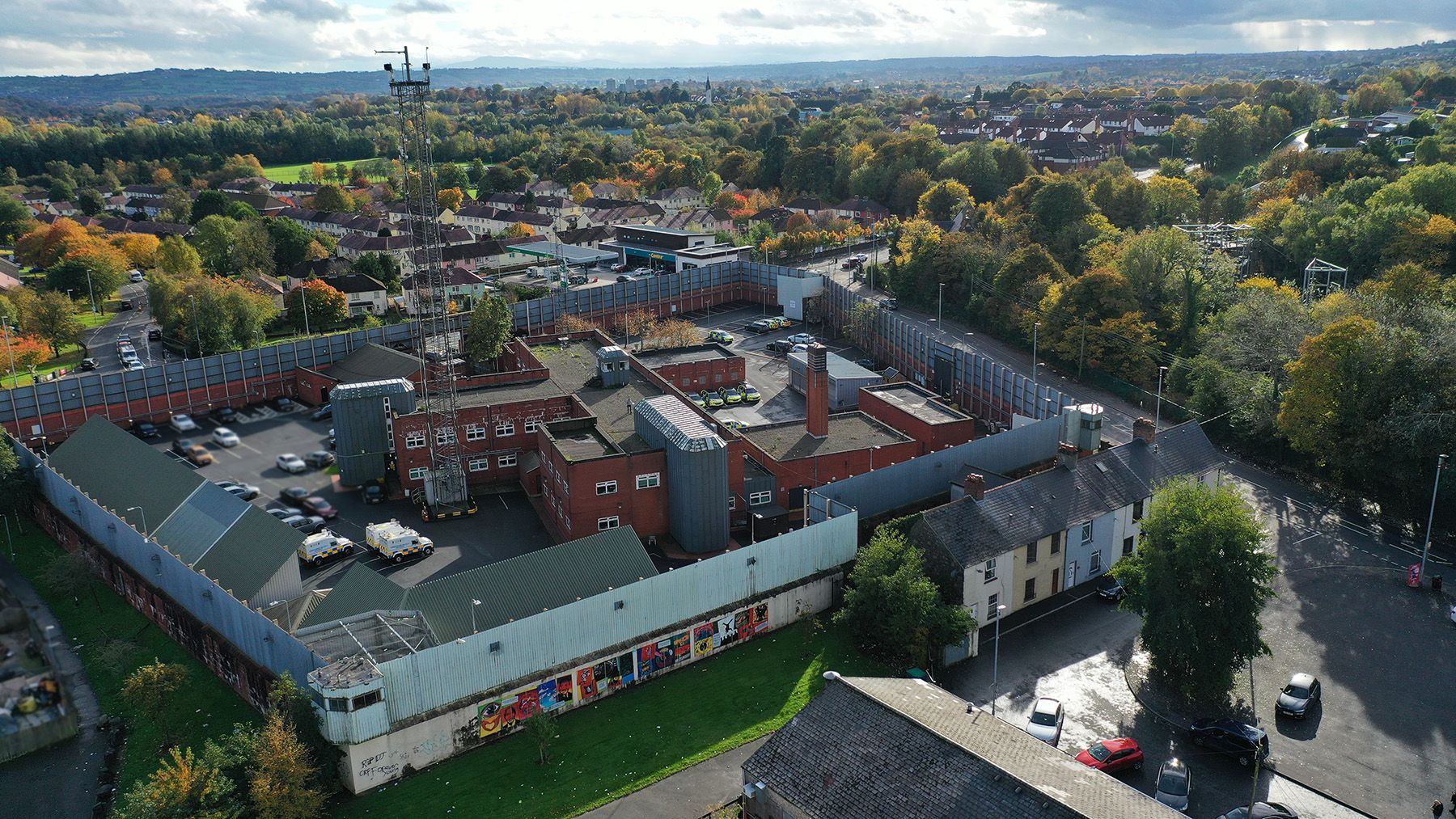
Speaking to the paper inside the Stewartstown Road compound, Chief Inspector Brannigan said: “I have absolutely no doubt that it [the exterior of the station] is a piece that has continued to manifest itself in terms of legacy.
“I have been West Belfast Commander now for the last two years and one of the first conversations I had with the Chief Constable was about the station and how it looks, particularly from outside to the public.
“Equally, as I have gone through those two years, I have realised that it is also a barrier to the police officers who are stationed here in terms of how they view their own personal security.
“Around 70 per cent of the police in West Belfast have less than four year’s service. Because I have a background of policing Twinbrook, Poleglass and Lagmore between 2005 and 2015 as a sergeant, with Sinn Féin endorsing policing in 2007, we took the Colin area from having two Land Rovers dispatched to every call – no police cars and very few beats – to officers walking in twos, only cars and bringing in bicycles.

“That is a mindset that I have been trying to put on our officers because this is just another policing area that we have the responsibility to go out and do a good job in.
“West Belfast is a different place than it was historically in terms of policing. We have much wider community support. All of those kinds of things which equal normalisation but we are doing it from this police station.
“It is a conflict for me, it is a conflict for the officers and what I am telling them. At the end of the day, we have managed to deliver a really high standard of delivery despite this.
“If there was one thing I would want for this area, it would be that the exterior of Woodbourne Police Station is normalised to whatever degree. Not reducing the security aspect of it, the safety and mindset of our officers in terms of their own personal security.
“You do not have to reduce security to reduce how the public perceive the message that you are sending by continuing that in today’s environment.”
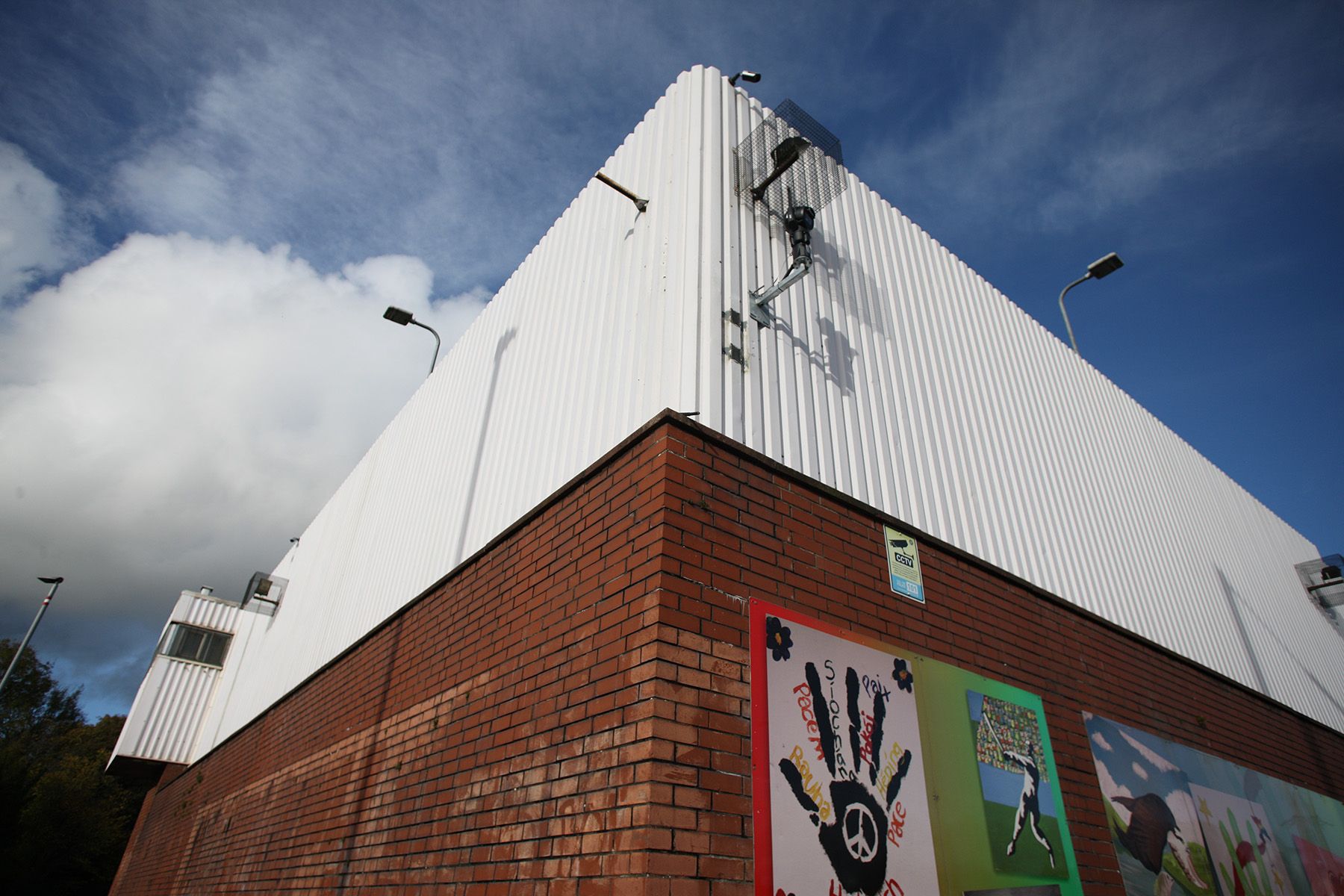
Woodbourne Police Station currently has around 200 officers based within its walls, split into 11 teams including five local policing teams which make up around 140 officers, 60 neighbourhood officers split across six teams and six civilian police support staff.
Chief Inspector Brannigan said that it would be unrealistic to suggest that the PSNI would move from the site but that there are ways to make the site look different.
“It would be my interpretation that the station is very strategically placed in terms of reassuring the loyalist community,” he continued. “If you were asking me do we need this size of a station, truthfully, probably not.
“It is a vast area to cover, and I understand the political representation brought to me over the geographical location that it covers and I know the argument is being made that it would be a good spot for a significant number of social housing. I get all that context but as a police officer, I don’t think there is anywhere else in West Belfast that the main police station should be.”

Chief Inspector Brannigan told us that given the normalisation of policing on the ground and the drive towards that, with more cars and police walking in the area that it is “a risk and a challenge to the organisation” in its relationship with the community surrounding the barracks to not consider the message that the look of the station sends.
He also told us that the challenges in the area come from legacy issues and the “small number of people” who still oppose the work of the PSNI.
“There has been a significant sea change in terms of people's attitude towards the police as we open up and make ourselves more accessible to the community,” he continued. “If there is something that the community tells us is an issue then I suggest we get around the table and talk about it.
“The overall governance structure of the community is the West Belfast Community Safety Forum. My conversations with them have been around how I am not here to impose policing on the area. In order for me to deliver what the community want; I have to ask the community.
“Every large-scale event, whether I am involved in the delivery of the policing operation or not, I got and I ask the community affected or their representation how it looks to them. That is our starting point to take the community's concerns onboard.”

The Chief Inspector spoke of the positive relationship his officers have developed with the organisers of Féile an Phobail in recent years.
“When I first came here, the police were on the periphery of Féile. They were looking at some of the hotspot areas that were affected by anti-social behaviour around it.
“Anywhere else in the city the cops would be part of that. I am not talking about being in the arena and dancing which happened last year, but I am talking about two cops walking in Falls Park reassuring people about the safety of their kids and parents knowing that there are cops there.
“Where there was a barrier before to the police being involved in the delivery of Féile, when we work together without us imposing it, it is about how we can work together to deliver it.”
He also pointed to the Colin area as an example of how policing can be done right in West Belfast.
“I had the right mix of young officers who just wanted to do a good job along with myself, knowing that we needed to take it to somewhere different, we needed to integrate into the community and build a relationship. Over nine years we did.
“That was me, as a sergeant delivering that. Having come from the RUC and having come from those days where in this area you would have had two police trucks supported by two military trucks attending a broken window.
“In 2010, a relatively short period of time from then, we introduced police walking in twos and bicycles. We had a patrolling strategy at that time where we did away with the Land Rovers completely except for a Friday and Saturday night between 7 o’clock and 11 o’clock because that was when kids came out in greater numbers and there was a potential damage to vehicles.”

Chief Inspector Brannigan said that as a police officer, it isn’t easy to bridge the gap between community confidence and the community wanting them in the area and having the confidence to do it.
“In my view, it was strong community leadership in the Colin area, which still exists today, along with a willingness from the police to be different because it was right.
“Those things worked and truthfully, two years ago when I was given the opportunity to come to West Belfast as the Area Commander when I should have been putting my feet up at this stage of my career, I wanted to replicate the positive impact that we had in Colin when it was under Lisburn’s command, across West Belfast.
“The people within the community that I work with each day are telling me that it is different. It is not perfect, and it never will be perfect but if the community want me to deliver perfection, then I am going to fail every day. Our officers are human, and I can’t guarantee perfection.
“What I can guarantee is that they will be well schooled, they will understand the community they are working in and they will have ownership of the problems. Whenever we come out of it, we will have a group of officers who have grown up with the community and are all moving in the same direction.”
ATTACKS: Chief Inspector Brannigan said that attacks on police vehicles are impacting on their ability to police West Belfast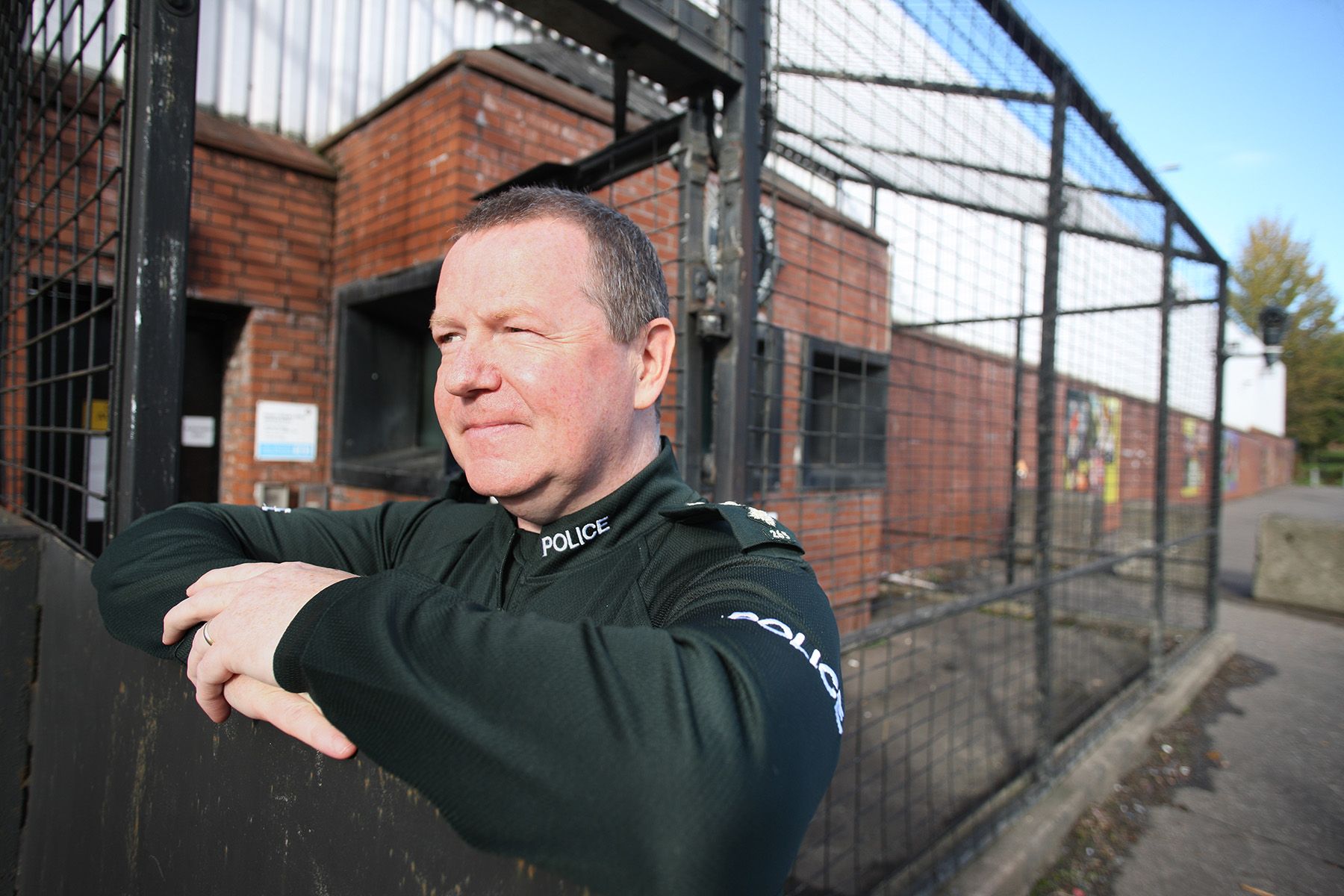
However, when it comes to policing in the area, Chief Inspector Brannigan said that attacks on police vehicles are resulting in him having to take cars off the road and replace them with Land Rovers. In the first six months of this year, 34 police cars had to be taken off the roads in West Belfast as a result of attacks.
He also pointed to the potential impact this could have on the community with a reduction in resources and the potential danger to civilians who could be in the vicinity of the police vehicles when they are attacked.
In relation to two recent murders in the area – and focusing specifically on the murder of Sean Fox – he said that the confidence of the community in the PSNI “takes a complete knocking".
“After incidents like that, we have to regroup and look at how we do business,” he said.
When it comes to the issues that the PSNI are dealing with in West Belfast, Chief Inspector Brannigan told us that they are seeing a major drugs problem.
“The availability of drugs, particularly at street level is massive. The open use and the discarding of needles is a significant issue.
“On a positive side, our drug seizures are up, our focus on drugs is up. We recently had a six week focus on drugs where we looked at the most prolific offenders and worked in conjunction with the community.

“We put a call out to the community that if they had any information to come forward which led to 16 house searches. The vast majority of which resulted in positive searches.
“The anti-social behaviour bracket is so wide which is why the figures are so colossal. The aspects of that which affect the community most here is the high level of motorcycle misuse with the likes of scramblers, the large number of kids gathering and putting fear in residents and the likes of Dunville Park being damaged with fires being set.
“Domestic violence is also a significant issue for us and probably creates the highest volume of calls which are deemed the highest priority on any given day,” he said.
On a positive note, he said that the amount of burglaries in the area has reduced significantly with West Belfast having the lowest number of reported burglaries across the city with more than half of those reported being as the result of unlocked doors and open windows.
When it comes to being held to account, Chief Inspector Brannigan said that policing in West Belfast has changed drastically.
“We don’t always get it right and when I don’t get it right I am held to account by Paul Maskey, the West Belfast Safety Community Forum, the local councillors and community workers on a monthly basis.
“But, it doesn’t have to wait a month and they can talk to me every day about issues or concerns. Where we don’t get it right, they ask me why and trusting me to fix it.
“That is the position we are in and while traditionally they would have been looking at what the formal process was to complain against the PSNI, that formal process is still there if they wish to use it but it has almost been replaced by holding me to account personally on a daily basis.”

